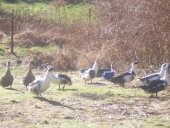Ducks can and will eat a number of bugs. I have found that they love slugs which are a good protein source. You may wish to check out edible bugs in your area. For example in my area we have squash bugs. I can plant a trap crop and let turkeys clear out the bugs. We also have tomato horn worm that is large and very edible. Japaneese Beatle are also abundent in July. All these bugs are edible to both humans and poultry. So I can use what is a pest as a feed for my poultry. You really want something that is abondent. Like if you had the famous bannana slug. In the right places in the North West you can collect a ton of them. In my area I can put up a beatle trap and collect a ton of them.
If you have the space you may wish to think of raising worms, crickets, mealworms, etc. as feed. Your free veggies/fruit from our local co-op grocery can easily be feedstock for an insect farm. Just use the items the duck do not like or do not quickly eat. Keeping a supply of insect protein readly at hand can supplement your food bills.
http://teca.fao.org/read/7927
http://cricket-breeding.com/
Finally, grow you feed. I always grow greens for my ducks. A surprising green is sweet potato vine. It is very edible to both people and ducks, with a high protein content. You can quickly put in a large area by planting cutting. I grow it for roots but I have many plats that just get harvested all summer for roots.
Check out
https://cgspace.cgiar.org/bitstream/handle/10568/21584/SweetpotatoBrochure.pdf?sequence=1
It is a small scale method for making silage. Ducks can be feed silage as part of their winter rations.
Here is a nice list of duck foods
http://www.backyardchickens.com/t/242460/the-ultimate-list-of-duck-treats-and-supplements
If you have a pond or source of clean fish you will find that ducks eat fish very well. You can supplement feeding what you catch in a minnow trap.
As for egg production you can check weight, color, behavior, etc. of hens to determine if feed is working for you.
There are two types of egg production, one is for eating eggs, the other for hatching eggs.
Egg production for egging just needs to keep hens healthy, at a constant weight, producing at a fair rate.
For Hatching I need to beef up the hens to max health so I can have high hatching rates.







